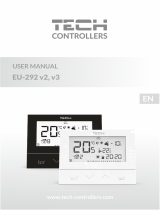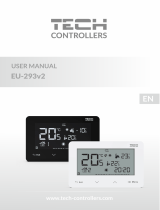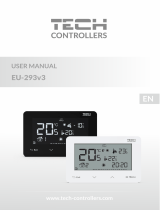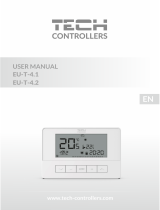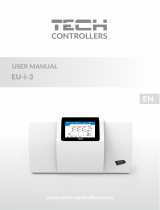Page is loading ...

EU-297 v2

TECH
2
CONTENTS
I. Safety ......................................................................................................................................................................... 3
II. Description of the device .......................................................................................................................................... 4
III. How to install the controller ..................................................................................................................................... 5
1. Installation of the regulator - batteries ................................................................................................................... 5
2. Installation of the regulator – power supply 230V .................................................................................................. 7
IV. Wireless controller receiver ...................................................................................................................................... 9
V. First start-up .............................................................................................................................................................. 9
VI. How to use the controller ....................................................................................................................................... 10
1. Principle of operation ............................................................................................................................................ 10
2. Operation modes ................................................................................................................................................... 10
VII. Device description ................................................................................................................................................... 10
1. Main screen description ........................................................................................................................................ 11
VIII. Controller functions ................................................................................................................................................. 12
1. Block diagram - main menu ................................................................................................................................... 12
1.1. Clock .............................................................................................................................................................. 12
1.2. Operation mode ............................................................................................................................................ 12
1.3. Constant pre-set temperature ....................................................................................................................... 13
1.4. Pre-set day temperature ............................................................................................................................... 13
1.5. Day from ........................................................................................................................................................ 13
1.6. Pre-set night temperature ............................................................................................................................. 13
1.7. Night from... .................................................................................................................................................. 13
1.8. Hysteresis....................................................................................................................................................... 14
1.9. Floor heating ON/OFF .................................................................................................................................... 14
1.10. Button lock ON/OFF ....................................................................................................................................... 15
2. Menu button functions ......................................................................................................................................... 15
2.1. Cooling/heating ............................................................................................................................................. 15
2.2. Built-in sensor calibration .............................................................................................................................. 16
2.3. Floor sensor calibration ................................................................................................................................. 16
2.4. Software version ............................................................................................................................................ 16
2.5. Default settings .............................................................................................................................................. 16
IX. How to register EU-297v2 ....................................................................................................................................... 17
X. Technical data .......................................................................................................................................................... 18
JG. 30.11.2022

EU-297
3
I. SAFETY
Before using the device for the first time the user should read the following regulations carefully. Not obeying the rules
included in this manual may lead to personal injuries or controller damage. The user’s manual should be stored in a safe
place for further reference.
In order to avoid accidents and errors, it should be ensured that every person using the device has familiarized themselves
with the principle of operation as well as security functions of the controller. If the device is to be sold or put in a different
place, make sure that the user’s manual is stored with the device so that any potential user has access to essential
information about the device.
The manufacturer does not accept responsibility for any injuries or damage resulting from negligence; therefore, users
are obliged to take the necessary safety measures listed in this manual to protect their lives and property.
WARNING
• High voltage! Make sure the regulator is disconnected from the mains before performing any activities
involving the power supply (plugging cables, installing the device etc.)
• The device should be installed by a qualified electrician.
• The regulator should not be operated by children.
WARNING
• The device may be damaged if struck by a lightning. Make sure the plug is disconnected from the power
supply during storm.
• Any use other than specified by the manufacturer is forbidden.
• It is recommended to periodically check the condition of the device.
Changes in the merchandise described in the manual may have been introduced subsequent to its completion on
30.11.2022. The manufacturer retains the right to introduce changes to the structure or colours. The illustrations may
include additional equipment. Print technology may result in differences in the colours shown.
We are committed to protecting the environment. Manufacturing electronic devices imposes
an obligation of providing for environmentally safe disposal of used electronic components
and devices. Hence, we have been entered into a register kept by the Inspection for
Environmental Protection. The crossed-out bin symbol on a product means that the product
may not be disposed of to household waste containers. Recycling of waste helps to protect
the environment. The user is obliged to transfer their used equipment to a collection point
where all electric and electronic components will be recycled.

TECH
4
II. DESCRIPTION OF THE DEVICE
The EU-297v2 room regulator is intended for controlling the heating device Its main task is to maintain the pre-set
flat/floor temperature by sending a signal to the heating device (contact closing) or the main controller, which controls
the actuators, when the room/floor temperature is below the pre-set value.
The EU-297v2 controller functions:
• Maintaining pre-set room temperature
• Manual mode
• Day/night mode
• Control of the floor sensor
• Possibility of pairing with the EU-MW-3 module
The EU-297v2 room regulator offers two display versions:
• standard (the data is displayed in black against white background)
• negative (the data is displayed in white against black background)
There are 2 color versions
WHITE
BLACK
EU-297v2 works with an additional EU-MW-3 signal receiver (included in the controller set), mounted near the heating
device.
Hardware versions:
1. EU-297 v2 RB, EU-297 v2 RBN – wireless version, powered with
two AAA 1,5V batteries;
2. EU-297 Z v2 RZ, EU-297 v2 RZN– wireless version, powered with
230V
Colour versions: black or white
Controller equipment:
• Touch buttons
• Front panel made of glass
• Built-in temperature sensor
• Batteries (battery version)

EU-297
5
III. HOW TO INSTALL THE CONTROLLER
NOTE
The device should be installed by a qualified person.
In the case of a wireless connection - a two-wire communication cable should be connected to the appropriate
connectors on the receiver.
The EU-297v2 room regulator may be used as a wall-mountable panel. In order to mount it, place the rear part of the
controller in the mounting box on the wall, insert the regulator and turn it slightly.
1. INSTALLATION OF THE REGULATOR - BATTERIES
WARNING
If pump manufacturer requires an external main switch, power supply fuse or additional residual current device
selective for distorted currents it is recomemnded not to connect pumps directly to pump control outputs.
To avoid damaging to the device, an additional safety circuit must be used between the regulator and the pump.
The manufacturer recommends the ZP-01 pump adapter, which must be purchased separately.

TECH
6
The room regulator should be connected to the heating device with a two-core cable. The cable connection of both
devices is shown in the diagram below:
NOTE
The regulator is powered with batteries - it is recommended to check the batteries from time to time and replace
them once every heating season.
heating
device

EU-297
7
2. INSTALLATION OF THE REGULATOR – POWER SUPPLY 230V
The room regulator may be used as a wall-mountable panel. In order to mount it, place the rear part of the controller in
the mounting box on the wall, insert the regulator and turn it slightly.

TECH
8
The room regulator should be connected to the heating device with a two-core cable. The cable connection of both
devices is shown in the diagram below:
heating
device
heating
device

EU-297
9
IV. WIRELESS CONTROLLER RECEIVER
The EU-297v2 regulator communicates with the heating device (or the CH boiler controller) by means of a radio signal
sent to the receiver. Such a receiver is connected to the heating device (or the CH boiler controller) by means of a two-
core cable, and communicates with the room regulator using a radio signal.
The receiver has three control lights:
• red control light 1 – signalises data reception;
• red control light 2 – indicates receiver operation;
• red control light 3 – goes on when the room temperature fails to reach the pre-set value – the heating device is switched
on.
NOTE
• In case of no communication (e.g. due to discharged battery), the receiver automatically disables the
heating device after 15 minutes.
V. FIRST START-UP
In order for the EU-297v2 controller to work properly, it is necessary to follow these steps when starting the device for
the first time:
1. Insert the batteries. In order to do it, remove the controller back cover (battery-powered version).
2. Connect the controller to the heating device.
3. If you want to use a room regulator to operate the floor heating system, connect an additional sensor to the floor
sensor connector.
channel change button
red control light 1
red control light 2
red control light 3

TECH
10
VI. HOW TO USE THE CONTROLLER
1. PRINCIPLE OF OPERATION
The EU-297v2 room regulator is designed to maintain the pre-set room temperature by sending a signal to the heating
device or the main controller when the pre- set room temperature has been reached. After receiving such a signal, the
heating device turns off.
NOTE
For the floor heating functions to be available, the floor sensor must be enabled in the controller menu.
2. OPERATION MODES
The room regulator may operate in one of the following operation modes:
• Day/night mode – In this mode the pre-set temperature value depends on the current time of the day. The user
may set different temperature values for the daytime and nighttime as well as define the exact time of entering
day mode and night mode. In order to activate this mode, press MENU button until one of the mode icons
appears on the main screen. The user may define the pre-set temperature and (after tapping on MENU
again) the time of entering day and night mode.
• Manual mode In this mode, the pre-set temperature is adjusted manually from the main screen view
with the use of these buttons: . Manual mode is activated after pressing MENU button. Once the manual
mode has been activated, the previous operation mode enters ‘sleep mode’ until the next pre-programmed
temperature change. Manual mode may be deactivated by pressing EXIT button.
• Constant mode – In this mode, the pre-set temperature will apply all the time, regardless of the time of day.
VII. DEVICE DESCRIPTION
The user operates device using toutch buttons.
1
2
3
4
5

EU-297
11
1. Display
2. EXIT button – press this button to display the room temperature/ floor temperature or to disable manual mode.
3. – press this button to decrease the edited value.
4. – press this button to increase the edited value.
5. MENU button– hold this button to enable manual mode or to set calibration. Press the MENU button to move
on to edit next parameters.
1. MAIN SCREEN DESCRIPTION
1. Battery level (battery version)
2. Maximum/minimum floor temperature - this icon is displayed only when the floor sensor is enabled in the
controller menu.
3. Hysteresis
4. Night mode
5. Day mode
6. Manual mode
7. Current time
8. Cooling/heating
9. Current temperature
10. Button lock
11. Pre-set temperature
3
9
4
11
2
1
8
10
7
6
5

TECH
12
VIII. CONTROLLER FUNCTIONS
The user navigates in the menu structure using touch buttons: EXIT, and MENU. In order to edit particular
parameters, press MENU. By pressing MENU the user may preview the controller functions. The edited parameter is
flashing. Use the buttons to change the parameter settings. Press MENU to confirm the changes and move on
to edit the next parameter.
1. BLOCK DIAGRAM - MAIN MENU
1.1. CLOCK
In order to set the time, press MENU button until the clock settings appear on the screen.
The settings concern the flashing parameter.
Use or to set the hour. Next, press MENU to move to the next parameter - minutes.
1.2. OPERATION MODE
This function enables the user to select one of the operation modes available - constant or
day/night, by selecting ON or OFF. In order to do it, press the MENU button until a mode
selection screen appears.
ON – this function is used to enable constant mode - it is possible to set constant
temperature.
OFF – this function is used to disable constant mode and enable day/night mode - it is
possible to set daytime and nighttime temperatures as well as the exact time of entering
each phase.
Menu
Clock
Operation mode
Constant pre-set
temperature
Pre-set day temperature
Day from...
Pre-set night temperature
Night from...
Hysteresis
Floor heating ON/OFF
Maximum temperature
Minimum temperature
HisteresisButton lock ON/OFF

EU-297
13
1.3. CONSTANT PRE-SET TEMPERATURE
After selecting ON in the operation mode selection screen, a constant temperature screen
will appear. Use the buttons to set the temperature. The temperature will apply
permanently, regardless of the time of day and the setting will be saved even after
restarting the device.
1.4. PRE-SET DAY TEMPERATURE
In order to define the pre-set day temperature, press MENU button until a flashing
icon appears on the screen.
Use or to set the day temperature.
1.5. DAY FROM
This function enables the user to define the exact time of entering the day mode. To configure this parameter, press
MENU until a flashing icon appear on the screen.
Use or to set the time of day mode activation.
1.6. PRE-SET NIGHT TEMPERATURE
In order to define the pre-set night temperature, press MENU button until a flashing
icon appears on the screen.
Use or to set the night temperature.
1.7. NIGHT FROM...
This function enables the user to define the exact time of entering the night mode. To configure this parameter, press
MENU until a flashing icon appear on the screen.
Use or to set the time of night mode activation.

TECH
14
1.8. HYSTERESIS
Room temperature hysteresis defines the pre-set temperature tolerance in order to
prevent undesired oscillation in case of small temperature fluctuation (within the
range of 0,2 - 5°C).
Example:
Pre-set temperature : 23°C
Hysteresis: 1°C
The room regulator reports that the temperature is too low when the room
temperature drops to 22 °C.
In order to set the hysteresis, press MENU until a flashing icon appears on the screen.
Use or to set the desired hysteresis value.
1.9. FLOOR HEATING ON/OFF
This function is used to enable (ON) or disable (OFF) the underfloor heating, with the
use of .
When the underfloor heating is enabled ( ), the user may configure the following
parameters:
• Maximum temperature - in order to set the maximum floor temperature,
press MENU until the floor heating icon appears on the screen. Next, use
or to enable the heating, and then use the same buttons to set the
maximum temperature.
• Minimum temperature - in order to set the minimum floor temperature, press MENU until the floor heating icon
appears on the screen. Next, use or to enable the heating, and then use the same buttons to set the
minimum temperature.
• Hysteresis - underfloor heating hysteresis defines the tolerance for the maximum and minimum temperature.
The settings range is from 0,2°C to 5 °C.
If the floor temperature exceeds the maximum temperature, the underfloor heating will be disabled. It will be
enabled only after the temperature has dropped below the maximum floor temperature minus the hysteresis
value.

EU-297
15
Example:
Maximum floor temperature - 33°C
Hysteresis- 2°C
When the floor temperature reaches 33°C, the underfloor heating will be
disabled. It will be activated again when the temperature drops to 31°C.
If the floor temperature drops below the minimum temperature, the
underfloor heating will be enabled. It will be disabled after the floor
temperature has reached the minimum value plus the hysteresis value.
Example:
Minimum floor temperature - 23°C
Hysteresis - 2°C
When the floor temperature drops to 23°C, the underfloor heating will be enabled. It will be disabled when the
temperature reaches 25°C.
1.10. BUTTON LOCK ON/OFF
It is possible to activate button lock. In order to do it, press the MENU button until
the icon appears on the screen and select ON. In order to unlock the
buttons, press and hold any button.
2. MENU BUTTON FUNCTIONS
By holding the MENU button the user may enter particular functions in the Menu.
2.1. COOLING/HEATING
This icon informs about the room heating or cooling to reach the pre-set
temperature. These messages are displayed alternately: cooling or heating.
Choose the working mode:
• heating
• cooling
Default working mode is heating.
ATTENTION!
INCORRECT MODE FUNCTION MAY RESULT IN REVERSE OPERATION OF THE REGULATOR!

TECH
16
2.2. BUILT-IN SENSOR CALIBRATION
Calibration should be performed while mounting or after it has been used for a long
time, if the room temperature measured by the sensor differs from the actual
temperature. Calibration setting range is from -9,9 to +9,9 ⁰C with the accuracy of
0,1⁰C.
To calibrate the built-in sensor, press the MENU button until the temperature sensor
calibration screen appears. Use the buttons to set the desired correction. To
confirm, press the MENU button (confirm and go on to edit the next parameter).
2.3. FLOOR SENSOR CALIBRATION
Floor sensor calibration (an additional icon is displayed: ) should be performed if
the floor temperature measured by the sensor differs from the actual temperature.
Calibration setting range is from -9,9 to +9,9 ⁰C with the accuracy of 0,1⁰C.
To calibrate the built-in sensor, press the MENU button until the floor sensor
calibration screen appears. Use the buttons to set the desired correction. To
confirm, press the MENU button (confirm and go on to edit the next parameter).
2.4. SOFTWARE VERSION
After pressing the MENU button the user may check the software version number.
The number is necessary while contacting the service staff.
2.5. DEFAULT SETTINGS
This function is used to restore factory settings. In order to do it, change the flashing
digit 0 to 1.

EU-297
17
IX. HOW TO REGISTER EU-297V2
In order to register the EU-297v2 controller, follow these steps:
• Press the Registration button on EU-MW-3
• Press the Registration button on the EU-297v2 regulator
NOTE
• The screen must be highlighted to register. To do this, press any button on the panel or click the
registration button. Pressing the registration button again will allow pairing.
• Once registration has been activated in EU-MW-3, it is necessary to press the registration button on the
EU-297v2 regulator within 2 minutes. When the time is over, the pairing attempt will fail.
If:
• the EU-297v2 regulator screen shows SUC and all the control lights in EU-MW-3 are flashing simultaneously - the
registration has been successful;
• the control lights in EU-MW-3 are flashing one after another from one side to the other - the EU-MW-3 module
has not received the signal from the main controller;
• the EU-297v2 regulator screen displays ERR and all the control lights in EU-MW-3 light up continuously - the
registration attempt failed.
Registration button –
EU-297v2
Registration button –
EU-MW-3

TECH
18
X. TECHNICAL DATA
* AC1 load category: single-phase, resistive or slightly inductive AC load.
** DC1 load category: direct current, resistive or slightly inductive load.
EU-297B v2
Temperature adjustment range
5oC ÷ 35oC
Power supply
2xAAA 1,5V batteries
Measurement error
± 0,5oC
Operation frequency
868MHz
EU-297Z v2
Temperature adjustment range
5oC ÷ 35oC
Power supply
230V ± 10% / 50Hz
Max. power consumption
0,1W
Measurement error
± 0,5oC
Operation frequency
868MHz
Register EU-MW-3
Power supply
230V ± 10% / 50Hz
Operation temperature
5°C ÷ 50°C
Max. power consumption
<1W
Potential-free cont. nom. out. load
230V AC / 0,5A (AC1) *
24V DC / 0,5A (DC1) **
Operation frequency
868MHz
Max. transmission power
25mW

EU-297
19
EU Declaration of conformity
Hereby, we declare under our sole responsibility that EU-297 v2 manufactured by TECH STEROWNIKI II Sp. z o.o., head-quartered
in Wieprz Biała Droga 31, 34-122 Wieprz, is compliant with Directive 2014/53/EU of the European parliament and of the
Council of 16 April 2014 on the harmonisation of the laws of the Member States relating to the making available on the market
of radio equipment, Directive 2009/125/EC establishing a framework for the setting of ecodesign requirements for energy-related
products as well as the regulation by the MINISTRY OF ENTREPRENEURSHIP AND TECHNOLOGY of 24 June 2019 amending the
regulation concerning the essential requirements as regards the restriction of the use of certain hazardous substances in electrical
and electronic equipment, implementing provisions of Directive (EU) 2017/2102 of the European Parliament and of the Council
of 15 November 2017 amending Directive 2011/65/EU on the restriction of the use of certain hazardous substances in electrical
and electronic equipment (OJ L 305, 21.11.2017, p. 8).
For compliance assessment, harmonized standards were used:
PN-EN IEC 60730-2-9 :2019-06 art. 3.1a Safety of use
PN-EN 62479:2011 art. 3.1 a Safety of use
ETSI EN 301 489-1 V2.2.3 (2019-11) art.3.1b Electromagnetic compatibility
ETSI EN 301 489-3 V2.1.1:2019-03 art.3.1 b Electromagnetic compatibility
ETSI EN 300 220-2 V3.2.1 (2018-06) art.3.2 Effective and coherent use of radio spectrum
ETSI EN 300 220-1 V3.1.1 (2017-02) art.3.2 Effective and coherent use of radio spectrum
PN EN IEC 63000:2019-01 RoHS.
Wieprz, 30.11.2022

TECH
20
/



